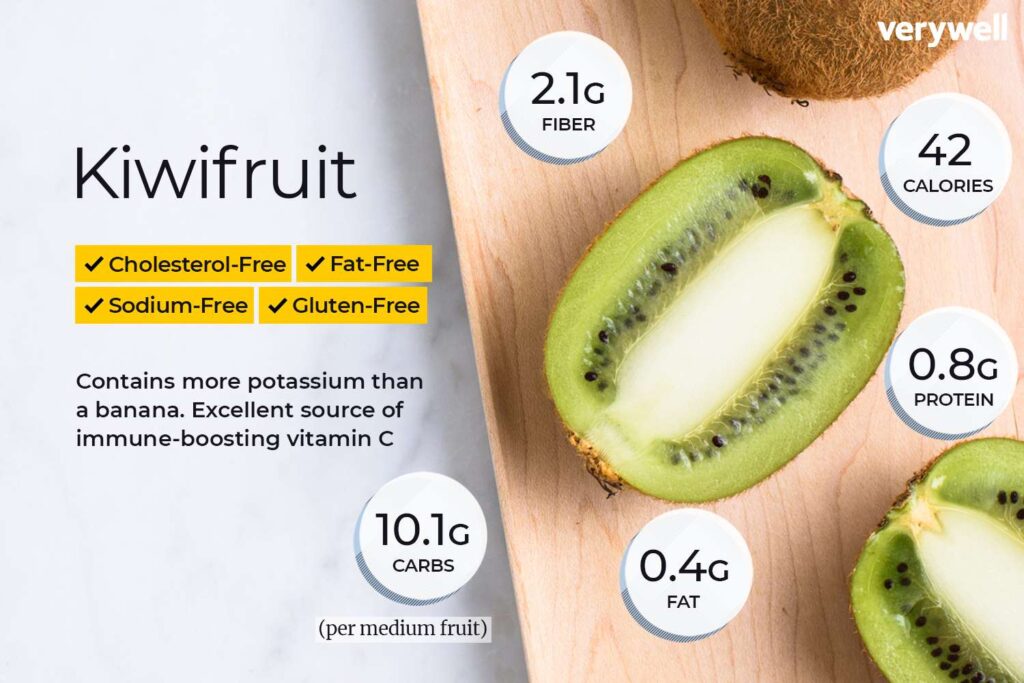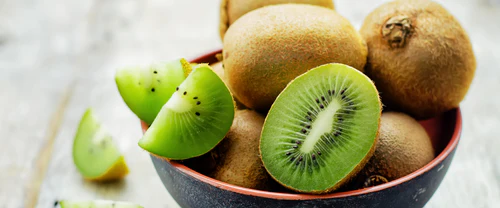Welcome to Tastetrove, your go-to destination for exploring the world’s most delicious and nutritious foods. Today, we’re diving into the vibrant world of kiwi fruit—a fuzzy, emerald-green gem that’s often overlooked but packs a powerful punch when it comes to health benefits. Native to China but popularized in New Zealand (hence its name, inspired by the kiwi bird), this superfruit has earned its spot in the spotlight for its exceptional nutrient density. Whether you’re slicing it into a salad, blending it into a smoothie, or eating it straight from the skin, kiwi offers a tangy-sweet flavor that’s as refreshing as it is beneficial.
Understanding Nutrition Facts is essential for making healthier food choices. By reading Nutrition Facts, you can learn about calories, vitamins, and minerals in your meals. Checking Nutrition Facts helps you balance proteins, carbs, and fats for better health. Many people rely on Nutrition Facts to track sugar and sodium intake daily. When comparing products, Nutrition Facts make it easier to choose the most nutritious option. Using Nutrition Facts regularly supports weight management and overall wellness.
But what makes kiwi a “superfruit”? It’s not just hype; it’s backed by science. Loaded with more vitamin C than an orange, plus fiber, antioxidants, and essential minerals, kiwi supports everything from immune function to heart health. In this comprehensive guide, we’ll break down the nutrition facts, explore the evidence-based health benefits, and share tips on incorporating kiwi into your daily routine. If you’re a fan of tropical delights, check out our https://tastetrove.net/ for more inspiration. Let’s peel back the layers and discover why kiwi deserves a permanent place on your plate.
Knowing Nutrition Facts allows you to understand what’s really in your food. By analyzing Nutrition Facts, you can see the balance of macronutrients and micronutrients. Reading Nutrition Facts helps you manage portion sizes and calorie intake. Shoppers use Nutrition Facts to compare labels and pick healthier options. Athletes focus on Nutrition Facts to optimize energy and recovery. Families rely on Nutrition Facts to plan balanced meals every day.
The Nutritional Powerhouse: Breaking Down Kiwi’s Profile
To understand why kiwi is hailed as a superfruit, let’s start with the facts. According to reliable sources, a single medium kiwi (about 75 grams) delivers a low-calorie yet nutrient-rich package. Here’s a detailed breakdown based on data from the USDA and health experts:
Exploring Nutrition Facts gives you insight into the value of every bite. Checking Nutrition Facts is a smart way to monitor daily nutrient intake. People use Nutrition Facts to stay aware of calories, fiber, and protein. Understanding Nutrition Facts helps you avoid hidden sugars and unhealthy fats. Comparing Nutrition Facts across products makes healthier choices easier. Relying on Nutrition Facts can guide you toward a balanced and nutritious lifestyle.
- Calories and Macronutrients: One medium kiwi contains approximately 42 calories, making it an ideal snack for weight management. It provides 10.1 grams of carbohydrates, including 6.7 grams of natural sugars for a quick energy boost without spiking blood sugar levels dramatically—thanks to its low glycemic index of around 50. Protein clocks in at 0.8 grams, while fat is minimal at 0.4 grams, mostly healthy unsaturated fats.
- Fiber Content: With 2.1 grams of dietary fiber per fruit (about 8% of your daily needs), kiwi shines in supporting digestion. This includes both soluble fiber, which helps regulate cholesterol and blood sugar, and insoluble fiber, which adds bulk to stool for better bowel regularity.
- Vitamins Galore: Kiwi is a vitamin C superstar, offering 56 milligrams per medium fruit— that’s over 60% of the daily value (DV) for adults. Vitamin C acts as a potent antioxidant, protecting cells from damage and aiding collagen production. It also boasts 34% DV of vitamin K (about 40 micrograms per 100 grams), crucial for blood clotting and bone health. Other notables include vitamin E (9% DV), which supports skin health, and folate (7% DV), important for cell division and pregnancy.
- Minerals and Micronutrients: Potassium is abundant at 148 milligrams per medium kiwi (4% DV), helping balance fluids and support heart function. You’ll also get copper (15% DV) for energy production and iron absorption, plus smaller amounts of magnesium, calcium, and phosphorus. These minerals work synergistically to maintain bone density and muscle function.

On a per-100-gram basis (roughly one large kiwi), the profile amps up: 61-65 calories, 14-15 grams carbs, 3 grams fiber, 1 gram protein, and 0.5 grams fat. Vitamin C jumps to 83-93 milligrams (over 100% DV), potassium to 312 milligrams, and vitamin K to 40 micrograms. Compared to other fruits, kiwi outshines oranges in vitamin C and bananas in potassium per serving, all while being lower in calories.
Learning Nutrition Facts helps you become more mindful of what you eat. By reviewing Nutrition Facts, you can identify the nutrients that support your health. Many diet plans emphasize Nutrition Facts to ensure balanced eating. Tracking Nutrition Facts allows you to control sugar, salt, and fat intake. Parents often check Nutrition Facts to choose healthier foods for their families. Using Nutrition Facts consistently is the key to long-term wellness.
Beyond basics, kiwi is rich in bioactive compounds like carotenoids (lutein, zeaxanthin, beta-carotene) and polyphenols (caffeic and chlorogenic acids). These antioxidants combat inflammation and oxidative stress. It also contains actinidin, a unique enzyme that aids protein digestion, making kiwi a natural tenderizer in recipes. Gold varieties (like SunGold) often have even higher vitamin C (up to 161 milligrams per 100 grams) and less fiber, while green kiwis provide more overall fiber.
For the most accurate data, visit the USDA FoodData Central database. Eating the fuzzy skin? It boosts fiber by 50%, vitamin E by 32%, and folate by 34%—just give it a good wash!
Why Kiwi Boosts Your Health: Evidence-Based Benefits
Kiwi isn’t just nutritious; it’s a health booster with benefits spanning multiple systems. Here’s what the research says:
Bolstering Immunity and Fighting Colds
Kiwi’s vitamin C content makes it a natural immune enhancer. This essential nutrient stimulates white blood cell production and protects against pathogens. A study found that consuming kiwis can shorten cold duration and reduce symptoms like congestion and sore throat, especially gold varieties. In one trial with elite athletes, eating two kiwis before bed improved sleep and recovery, indirectly supporting immunity by reducing stress. Antioxidants like carotenoids further neutralize free radicals, lowering infection risk. For those prone to respiratory issues, kiwi may alleviate asthma symptoms by reducing inflammation in the airways.
Promoting Digestive Wellness
If you’re battling constipation or IBS, kiwi could be your ally. Its fiber mix— one-third soluble, two-thirds insoluble— retains water, softens stool, and speeds transit time. A clinical trial with 75 constipated individuals showed that two kiwis daily improved frequency, consistency, and reduced straining, outperforming prunes or psyllium in some aspects with fewer side effects. Actinidin enzyme breaks down proteins, easing digestion, while prebiotic fibers feed gut bacteria for better microbiome health. Studies confirm kiwi promotes laxation without disrupting normal function, making it a gentle alternative to laxatives. It’s even low-FODMAP, suitable for sensitive guts.
Supporting Heart Health and Blood Pressure
Kiwi’s potassium, fiber, and antioxidants form a heart-protective trio. Potassium relaxes blood vessels, countering sodium’s effects to lower blood pressure—a key factor in preventing strokes and heart disease. Fiber binds cholesterol in the gut, reducing blood levels, while vitamin C and E prevent oxidation of LDL cholesterol. A 2022 randomized trial found that two kiwis daily for seven weeks lowered systolic blood pressure in healthy adults. Another study in smokers showed reduced platelet aggregation, cutting clot risk. Overall, regular kiwi intake may slash heart disease risk by up to 15%, per observational data.
Enhancing Skin and Bone Health
Vitamin C in kiwi fuels collagen synthesis, keeping skin firm and elastic while speeding wound healing. A review linked collagen supplements (boosted by vitamin C) to improved elasticity and reduced wrinkles. Antioxidants combat UV damage, promoting a youthful glow. For bones, vitamin K, calcium, and phosphorus prevent osteoporosis by aiding mineralization. Potassium also helps prevent kidney stones by alkalizing urine.
Potential Cancer-Fighting Properties
While not a cure, kiwi’s antioxidants may reduce cancer risk by protecting DNA from oxidative damage. Vitamin C affects cancer cells directly, and fiber promotes colon health by fostering beneficial bacteria and regular bowels, potentially lowering colorectal cancer odds. A 2020 overview highlighted kiwi’s anticancer potential, though more human studies are needed.
Additional Perks: Sleep, Pregnancy, and Anti-Inflammation
Eating kiwis before bed may enhance sleep quality due to serotonin precursors and antioxidants. For pregnancy, folate guards against neural tube defects. Proteins like kiwellin and kissper offer anti-inflammatory effects, potentially easing gut inflammation.
Incorporating Kiwi into Your Diet
Maximize kiwi’s benefits by eating 1-2 daily. Slice it for salads, blend into our kiwi smoothie recipe, or add to yogurt parfaits. Try kiwi salsa for a twist on tacos—pair with fish from our seafood essentials guide. Select plump, fragrant fruits; store ripe ones in the fridge for up to a week. For variety, explore golden kiwis for sweeter flavor.
Potential Risks and Considerations
Kiwi is safe for most, but allergies (often linked to latex or birch pollen) can cause itching or swelling. High vitamin K may interact with blood thinners—consult a doctor. Overconsumption might lead to mild diarrhea due to fiber.
Conclusion: Make Kiwi Your Daily Superfruit
From immunity boosts to digestive relief, kiwi’s nutrition facts prove it’s a true superfruit. At Tastetrove, we encourage experimenting with this versatile gem—your body will thank you. For more on nutrient-packed foods, browse our superfoods section. Dive in and elevate your health, one kiwi at a time!
The Nutritional Powerhouse: Breaking Down Kiwi’s Profile
To understand why kiwi is hailed as a superfruit, let’s start with the facts. According to reliable sources, a single medium kiwi (about 75 grams) delivers a low-calorie yet nutrient-rich package. Here’s a detailed breakdown based on data from the USDA and health experts:
- Calories and Macronutrients: One medium kiwi contains approximately 42 calories, making it an ideal snack for weight management. It provides 10.1 grams of carbohydrates, including 6.7 grams of natural sugars for a quick energy boost without spiking blood sugar levels dramatically—thanks to its low glycemic index of around 50. Protein clocks in at 0.8 grams, while fat is minimal at 0.4 grams, mostly healthy unsaturated fats.
- Fiber Content: With 2.1 grams of dietary fiber per fruit (about 8% of your daily needs), kiwi shines in supporting digestion. This includes both soluble fiber, which helps regulate cholesterol and blood sugar, and insoluble fiber, which adds bulk to stool for better bowel regularity.
- Vitamins Galore: Kiwi is a vitamin C superstar, offering 56 milligrams per medium fruit— that’s over 60% of the daily value (DV) for adults. Vitamin C acts as a potent antioxidant, protecting cells from damage and aiding collagen production. It also boasts 34% DV of vitamin K (about 40 micrograms per 100 grams), crucial for blood clotting and bone health. Other notables include vitamin E (9% DV), which supports skin health, and folate (7% DV), important for cell division and pregnancy.
- Minerals and Micronutrients: Potassium is abundant at 148 milligrams per medium kiwi (4% DV), helping balance fluids and support heart function. You’ll also get copper (15% DV) for energy production and iron absorption, plus smaller amounts of magnesium, calcium, and phosphorus. These minerals work synergistically to maintain bone density and muscle function.
On a per-100-gram basis (roughly one large kiwi), the profile amps up: 61-65 calories, 14-15 grams carbs, 3 grams fiber, 1 gram protein, and 0.5 grams fat. Vitamin C jumps to 83-93 milligrams (over 100% DV), potassium to 312 milligrams, and vitamin K to 40 micrograms. Compared to other fruits, kiwi outshines oranges in vitamin C and bananas in potassium per serving, all while being lower in calories.
Beyond basics, kiwi is rich in bioactive compounds like carotenoids (lutein, zeaxanthin, beta-carotene) and polyphenols (caffeic and chlorogenic acids). These antioxidants combat inflammation and oxidative stress. It also contains actinidin, a unique enzyme that aids protein digestion, making kiwi a natural tenderizer in recipes. Gold varieties (like SunGold) often have even higher vitamin C (up to 161 milligrams per 100 grams) and less fiber, while green kiwis provide more overall fiber.
For the most accurate data, visit the USDA FoodData Central database. Eating the fuzzy skin? It boosts fiber by 50%, vitamin E by 32%, and folate by 34%—just give it a good wash!
Why Kiwi Boosts Your Health: Evidence-Based Benefits
Kiwi isn’t just nutritious; it’s a health booster with benefits spanning multiple systems. Here’s what the research says:
Bolstering Immunity and Fighting Colds
Kiwi’s vitamin C content makes it a natural immune enhancer. This essential nutrient stimulates white blood cell production and protects against pathogens. A study found that consuming kiwis can shorten cold duration and reduce symptoms like congestion and sore throat, especially gold varieties. In one trial with elite athletes, eating two kiwis before bed improved sleep and recovery, indirectly supporting immunity by reducing stress. Antioxidants like carotenoids further neutralize free radicals, lowering infection risk. For those prone to respiratory issues, kiwi may alleviate asthma symptoms by reducing inflammation in the airways.
Promoting Digestive Wellness
If you’re battling constipation or IBS, kiwi could be your ally. Its fiber mix— one-third soluble, two-thirds insoluble— retains water, softens stool, and speeds transit time. A clinical trial with 75 constipated individuals showed that two kiwis daily improved frequency, consistency, and reduced straining, outperforming prunes or psyllium in some aspects with fewer side effects. Actinidin enzyme breaks down proteins, easing digestion, while prebiotic fibers feed gut bacteria for better microbiome health. Studies confirm kiwi promotes laxation without disrupting normal function, making it a gentle alternative to laxatives. It’s even low-FODMAP, suitable for sensitive guts.
Supporting Heart Health and Blood Pressure
Kiwi’s potassium, fiber, and antioxidants form a heart-protective trio. Potassium relaxes blood vessels, countering sodium’s effects to lower blood pressure—a key factor in preventing strokes and heart disease. Fiber binds cholesterol in the gut, reducing blood levels, while vitamin C and E prevent oxidation of LDL cholesterol. A 2022 randomized trial found that two kiwis daily for seven weeks lowered systolic blood pressure in healthy adults. Another study in smokers showed reduced platelet aggregation, cutting clot risk. Overall, regular kiwi intake may slash heart disease risk by up to 15%, per observational data.
Enhancing Skin and Bone Health
Vitamin C in kiwi fuels collagen synthesis, keeping skin firm and elastic while speeding wound healing. A review linked collagen supplements (boosted by vitamin C) to improved elasticity and reduced wrinkles. Antioxidants combat UV damage, promoting a youthful glow. For bones, vitamin K, calcium, and phosphorus prevent osteoporosis by aiding mineralization. Potassium also helps prevent kidney stones by alkalizing urine.
Potential Cancer-Fighting Properties
While not a cure, kiwi’s antioxidants may reduce cancer risk by protecting DNA from oxidative damage. Vitamin C affects cancer cells directly, and fiber promotes colon health by fostering beneficial bacteria and regular bowels, potentially lowering colorectal cancer odds. A 2020 overview highlighted kiwi’s anticancer potential, though more human studies are needed.
Additional Perks: Sleep, Pregnancy, and Anti-Inflammation
Eating kiwis before bed may enhance sleep quality due to serotonin precursors and antioxidants. For pregnancy, folate guards against neural tube defects. Proteins like kiwellin and kissper offer anti-inflammatory effects, potentially easing gut inflammation.
Incorporating Kiwi into Your Diet
Maximize kiwi’s benefits by eating 1-2 daily. Slice it for salads, blend into our kiwi smoothie recipe, or add to yogurt parfaits. Try kiwi salsa for a twist on tacos—pair with fish from our seafood essentials guide. Select plump, fragrant fruits; store ripe ones in the fridge for up to a week. For variety, explore golden kiwis for sweeter flavor. You can even make kiwifruit cups by cutting in half and scooping with a spoon, add to fruit cocktails with pineapple and mango, blend into green smoothies with spinach and apple, freeze slices for snacks, or dice into salads with spinach, walnuts, and feta.
Recommended Kiwi Products for 2025
Elevate your kiwi experience with these top-recommended products that harness the superfruit’s power for health and convenience. Whether fresh, supplemental, or in skincare, these picks are backed by recent accolades and expert reviews.
- Zespri SunGold Kiwifruit: This golden variety just clinched Good Housekeeping’s 2025 Best Snack Award for the fifth consecutive year, praised for its sweet taste and superior vitamin C content (up to 161 mg per fruit). Perfect for snacking or smoothies, it’s the #1 kiwi brand driving category growth. Available at major grocers or Zespri’s site.
- Green Regimen Kiwi Optimize Digestive Health Supplement: Featuring Actazin kiwi extract from New Zealand kiwifruit, this 2025 standout supports gut health with natural enzymes and fiber. Users report improved digestion and regularity—ideal if you can’t eat fresh kiwis daily. Check reviews and purchase on Amazon (consult a doctor before starting).
- Kiwi Botanicals Brightening Eye Cream with Manuka Honey: For skin lovers, this 2025 top pick combines kiwi extract’s antioxidants with Manuka honey for hydration and brightening. It reduces puffiness and fights fine lines, making it a luxurious add-on to your routine. Find it at Sephora.

These products make it easy to tap into kiwi’s benefits year-round. For more wellness picks, explore our superfoods shop.
Frequently Asked Questions (FAQs)
Got questions about kiwi? We’ve compiled the most common ones based on expert insights to help you get the most out of this superfruit.
Q: What nutrients are found in kiwifruit?
A: Per 100 grams of peeled kiwi, you’ll get 65 kcal energy, 13.8 g carbohydrates, 2.1 g fiber, 58.5 mg vitamin C (over 65% DV), 24 mg calcium, 14.8 mg magnesium, 28 mg phosphorus, 302 mg potassium, 0.128 mg copper, 33 µg folate, and 40.3 µg vitamin K.
Q: What are the health benefits of kiwifruit?
A: Kiwifruit supports skin health via collagen production and wound healing, improves sleep, boosts heart health and manages blood pressure with fiber, potassium, and antioxidants, helps prevent kidney stones, may reduce cancer risk by minimizing DNA damage, eases constipation, offers anti-inflammatory effects from proteins like kiwellin and kissper, aids pregnancy with folate, and strengthens bones with vitamin K, calcium, and phosphorus.
Q: Can kiwifruit help with sleep?
A: Yes, a 2023 study showed that eating two kiwifruits one hour before bed for four weeks improved sleep and recovery in elite athletes. It’s promising for sleep issues, but consult a doctor for personalized advice.
Q: How does kiwifruit support heart health?
A: Its fiber, potassium, and antioxidants team up: potassium relaxes blood vessels to control blood pressure, while fiber shields against heart disease.
Q: Can kiwifruit help prevent kidney stones?
A: Absolutely—its high potassium content helps by promoting an alkaline urine environment that inhibits stone formation.
Q: Is kiwifruit safe for everyone?
A: Generally yes, but monitor potassium if on beta-blockers or with kidney issues. Vitamin K may interact with blood thinners like warfarin—check with your doctor. Allergies are possible, especially if sensitive to latex or birch pollen.
Q: What are the symptoms of an allergic reaction to kiwifruit, and what should be done?
A: Severe reactions (anaphylaxis) include hives, facial swelling, wheezing, rapid heartbeat, dizziness, vomiting, or fainting. Use an epinephrine pen if available, call 911, have the person lie down (on side if vomiting), and stay until help arrives. A second dose may be needed after 5-15 minutes.
For more tailored advice, visit Medical News Today.
Potential Risks and Considerations
Kiwi is safe for most, but allergies (often linked to latex or birch pollen) can cause itching or swelling. High vitamin K may interact with blood thinners—consult a doctor. Overconsumption might lead to mild diarrhea due to fiber.

Conclusion: Make Kiwi Your Daily Superfruit
From immunity boosts to digestive relief, kiwi’s nutrition facts prove it’s a true superfruit. With easy incorporation tips, standout products, and answers to your FAQs, you’re equipped to make it a staple. At Tastetrove, we encourage experimenting with this versatile gem—your body will thank you. For more on nutrient-packed foods, browse our superfoods section. Dive in and elevate your health, one kiwi at a time!
